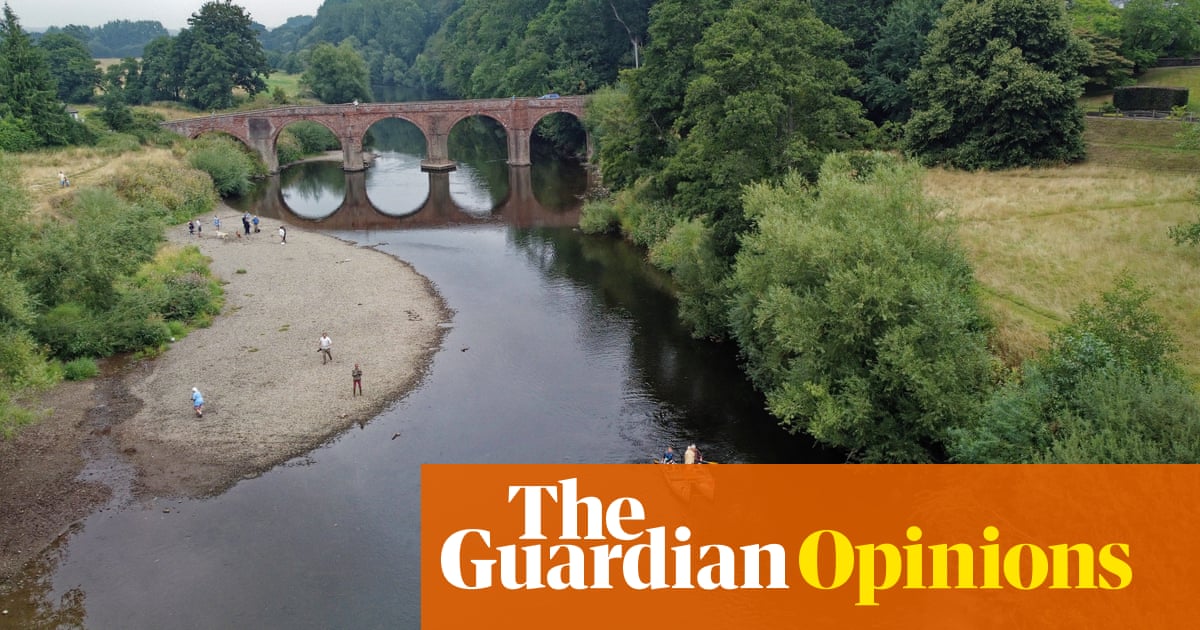Is pollution in Britain’s rivers getting worse? There is more good news than you can imagine Michelle Jackson

Public outrage over river pollution has been heartening to see. Over the past few years, stories about sewage pollution in rivers have captured the public’s attention, leading to campaigns and protests, such as River Action UK’s upcoming march for clean water on 26 October in London. It is important to protect our rivers because they are biodiversity hotspots and important for human health. However, as a freshwater ecologist, I know there is more to the story than you might believe. From my point of view, there is good news when it comes to our rivers. I’d even say other rivers in England are in the best shape they’ve been in for hundreds of years.
Many rivers in the UK are polluted, but we need to recognize that this is not an emergent issue but a long-term issue that has been largely ignored by the media and politicians for decades. Much of the recent outrage over pollution has to do with increased awareness, rather than a sudden increase in pollution itself. Only by understanding how these ecosystems have changed over time and reflecting on past successes can we make real progress.
It has been widely reported that English rivers have gone from 97% being classified as having “good chemical status” in 2016 to none in 2019. Across the UK, the Environment Agency monitors water quality by directly measuring some pollutants and identifying life. in that river. . This data is then used to classify the water quality of our rivers: “high”, “good”, “average”, “poor” or “bad”. However, instead of the water quality dropping significantly within the time frame, the way we measure it has changed – this decline is considered an artifact of the data. Starting in 2019, new chemicals were included in the testing, among them “ubiquitous, persistent, bioaccumulative, toxic substances”, which lead to these drastic changes.
The media has also reported an increase in the number of “sewage drains” – when raw sewage (rather than treated sewage) is pumped into our oceans, lakes, and rivers. In 2016, data was only available from 862 storm surges, and this increased to 6,182 in 2018, 12,092 in 2020, and 13,080 in 2022. Of course, the thought of any raw sewage entering water bodies is disgusting and we have to do work to reduce this. to zero by upgrading our Victorian wastewater infrastructure. The point, though, is that the problem may not have gotten worse in recent years — it’s just that we’re now looking for it properly.
Other water quality tests show that some things have improved. For example, many invertebrates can only survive when pollution levels are low, so assessing what species are present provides a quick and inexpensive way to measure water quality. Various metrics are calculated from data on invertebrate counts – and a higher score means the water is cleaner. Using this data (and related metrics on algae, fish, hydrology and nutrients), only 15% of rivers in the UK are currently classified as having “good ecological status”, which sounds pretty bad, especially as this is down from 24 % in 2009.
However, there are a few things to consider. First, a robust analysis of 223,300 invertebrate sampling data points by researchers at the UK Center for Ecology & Hydrology, using records from 1989 to 2018, showed that invertebrate biodiversity has increased over time across the UK without considering the size of the river and covering the land. Although this situation has decreased in some cases in the last 20 years, the headline here is that there is more wildlife in our rivers now than there was three decades ago. For example, the mayfly, stonefly, and caddisfly families (which are very sensitive to water quality) have increased by 300% during that period.
Second, the way rivers are classified uses the “one out, all out” principle. This means that rivers must fail in one of 20 criteria to be downgraded from “good” to “average” ecological status. In other words, the scale with the worst score determines the overall situation. Therefore, the overall water quality may be more positive than it appears at first glance. The increase in river invertebrate biodiversity across the UK is good news and shows how far we have come in improving water quality in my lifetime.
At least in part, this can be attributed to improvements in wastewater treatment resulting in reduced nutrient pollution, with research showing a decrease in phosphate levels from 1997. This followed the 1991 European Union directive on urban wastewater treatment, which strengthened law and forced water. companies to improve wastewater treatment. However, nutrient levels are still higher today than they would be from sewage and agricultural practices, so there is still work to be done. Some of my group’s research has shown that additional phosphorus reduction from effective wastewater treatment would be the best way to further benefit biodiversity.
Water companies need to be scrutinized more as there is evidence to suggest that they are often still in breach of their licences. They are only supposed to release raw sewage when there is heavy rain. If this reaches a critical level that the sewage would support and endanger from the wrong way, so to speak, water companies are legally allowed to discharge untreated waste. With increasing public concern, laws are beginning to tighten on this, and thus increasing surveillance data. Only time will tell, data from a new network of event time monitors covering all storm surges (through 2023) is being analyzed. Although we need to reduce the use of storm surges, we cannot now confidently claim that they are, in fact, being used more often now than in the past. This is not to minimize the problem, just to say that it may not be recent.
There are still reasons to protest at events such as the River Action UK march. I will definitely be there. Despite improvements in nutrient levels and biodiversity, there are chemical pollutants emerging and we have very little information about their effects. This is where I think the concerned public should now focus their attention. These pollutants are typically household and medical products that run off and are not removed from wastewater treatment plants, such as beauty products and pest treatments. Globally, freshwater ecosystems – which act as a key component for biodiversity – are one of the most threatened systems on the planet. They are also often not reflected in the law – so don’t stop campaigning, make sure you represent the truth accurately so we can make real, actionable change.
-
Michelle Jackson is associate professor of freshwater/marine ecology at the University of Oxford. Prof Jackson previously conducted one study which received funding from a wastewater treatment company, and currently has no industry funding.
#pollution #Britains #rivers #worse #good #news #imagine #Michelle #Jackson



